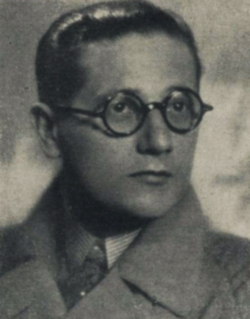Nicolae Crevedia | |
|---|---|
 Crevedia in 1938 | |
| Born | Niculae Ion Cârstea December 7, 1902 Crevedia Mare, Vlașca County, Kingdom of Romania |
| Died | November 5, 1978 (aged 75) Bucharest, Socialist Republic of Romania |
| Occupation | Journalist, diplomat, civil servant, translator |
| Nationality | Romanian |
| Period | 1924–1977 |
| Genre | Lyric poetry, free verse, epigram, satire, sketch story, reportage, political novel, autofiction |
| Literary movement | Gândirea |
| Signature | |
Nicolae Crevedia (born Niculae Ion Cârstea; December 7, 1902 – November 5, 1978) was a Romanian journalist, poet and novelist, father of the writer-politician Eugen Barbu. Of Muntenian peasant roots, which shaped his commitment to agrarian and then far-right politics, as well as his dialectal poetry and humorous prose, he preferred bohemian life to an academic career. As a writer at Gândirea, Crevedia became a follower of Nichifor Crainic, and worked with him on various other press venues, from Calendarul to Sfarmă-Piatră. His poetic output and his political outlook were both nominally influenced by his peasant background; in practice, however, he gave literary expression to the suburban environment (or mahala), and adored the modernist poetry of Tudor Arghezi.
Turning to fascism, Crevedia sympathized with the Iron Guard, and, in the late 1930s, contributed to the press campaigns vilifying ideological enemies, while also putting out novels, reportage pieces, and anthologies. His affair with the Iron Guard muse Marta Rădulescu was at the center of a literary scandal, and was fictionalized by Crevedia in one of his novels. Fluent in Bulgarian, he became press attaché in the Kingdom of Bulgaria under the National Legionary State, serving to 1946. He was sidelined by the Romanian communist regime in the late 1940s and early '50s, when he was employed as a minor clerk—though he was largely spared persecution, leading his rival Ion Caraion to suggest that he was an asset of the regime. Alongside his mentor Crainic, he contributed to the propaganda review Glasul Patriei.
Crevedia was more fully recovered under national communism in the 1960s, and lived to see the communist ascendancy of his son Barbu. Various authors see him as partly responsible for the latter phenomenon, alleging that Crevedia had ghostwritten Barbu's debut novel, The Pit. Crevedia's own poetry, much of it was heavily indebted to Arghezi, Ion Minulescu and Sergei Yesenin, was reprinted in various installments to 1977. It is regarded by critics as a minor but picturesque contribution to modern Romanian literature. Upon his death at age 75, he was survived by Barbu, who went on to establish the Greater Romania Party, as well as by his daughter Diana Cristev, a literary researcher.